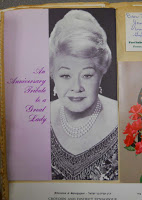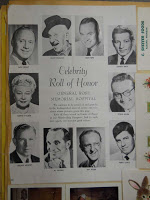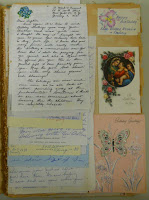Sophie Tucker
Description by Allison Lange, Archives and Special Collections Assistant and PhD candidate in history
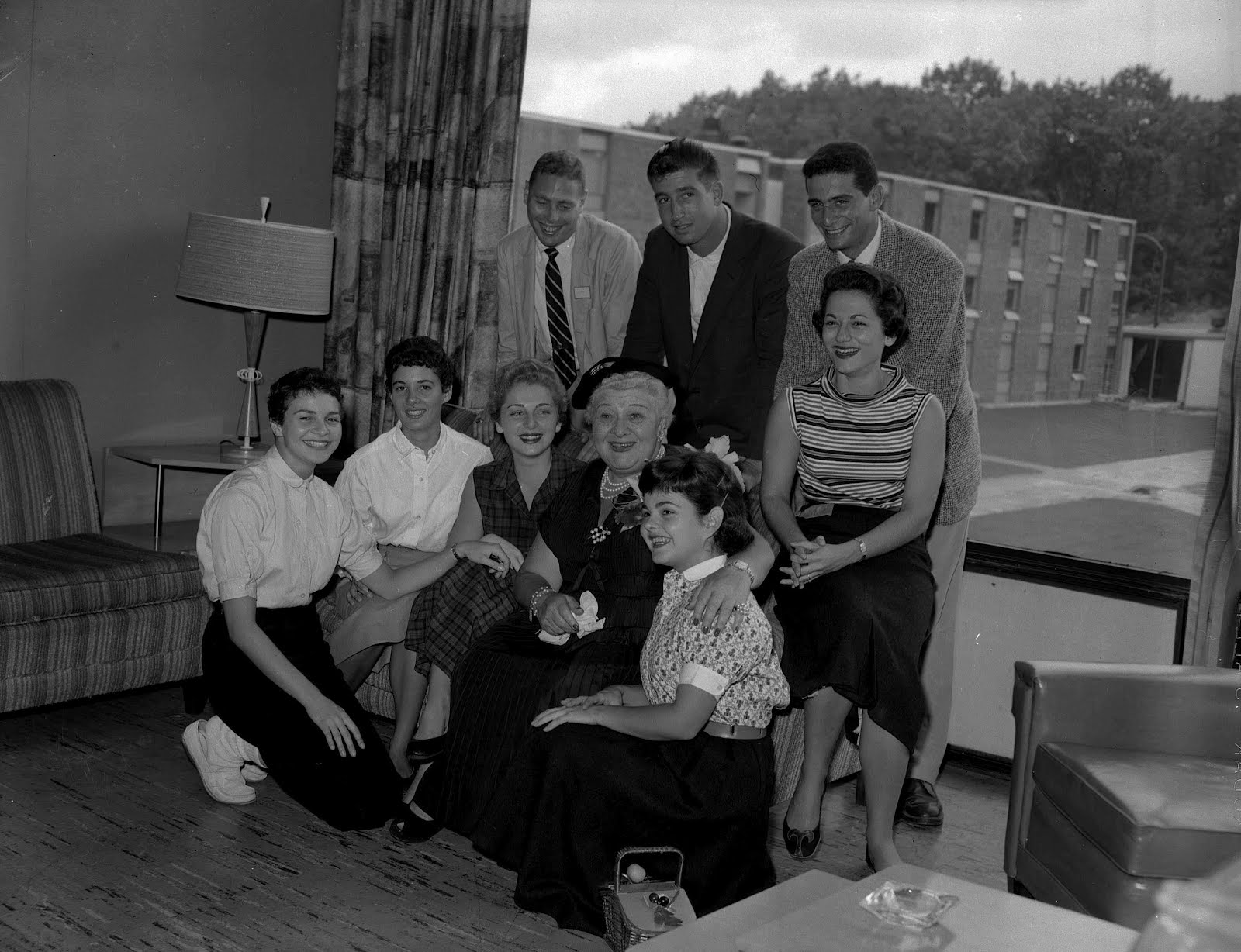
The Robert D. Farber University Archives and Special Collections Department holds a collection of scrapbooks donated to the university by singer, comedian and entertainer Sophie Tucker. Tucker’s career in the United States and Europe spanned from 1906 until her death in 1966 at the age of 80. Nicknamed “The Last of the Red Hot Mamas,” Tucker was famous for her risqué performances that challenged accepted ideas about race, ethnicity and gender. Tucker (and, later, her assistants) compiled the scrapbooks for over 50 years, and Brandeis houses volumes from the years 1957 to 1965. (The New York Public Library holds her scrapbooks from earlier years.) The scrapbooks feature meticulously collected and arranged pieces that reveal Tucker’s professional and personal life.
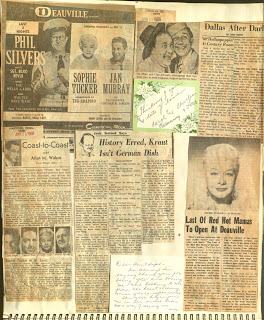 Sophie Tucker was born Sonya Kalish in Russia in 1886. She and her family immigrated to the United States with Italian papers soon after her birth and changed the family name to Abuza. At 17, she married Louis Tuck. When her marriage failed (the first of her three marriages to end in divorce) soon after the birth of her only son, Albert, she left her son with her family and went to New York City to find work as an entertainer. Adding “-er” to her married name, she began performing as a singer and in blackface. As her story goes, her make-up box disappeared before one performance, and she had to go onstage without her blacked face. She was a hit, and she never performed in black face again.
Sophie Tucker was born Sonya Kalish in Russia in 1886. She and her family immigrated to the United States with Italian papers soon after her birth and changed the family name to Abuza. At 17, she married Louis Tuck. When her marriage failed (the first of her three marriages to end in divorce) soon after the birth of her only son, Albert, she left her son with her family and went to New York City to find work as an entertainer. Adding “-er” to her married name, she began performing as a singer and in blackface. As her story goes, her make-up box disappeared before one performance, and she had to go onstage without her blacked face. She was a hit, and she never performed in black face again.
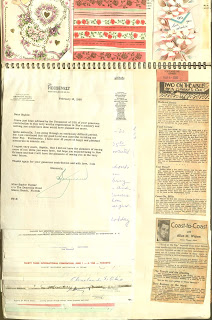
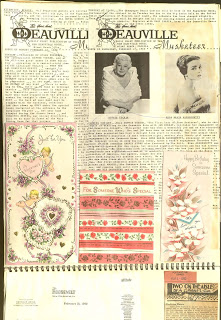 Tucker’s music and style were influenced by the blues and jazz, music styles dominated by African Americans at the time. She worked with a number of African American composers and artists, which was unusual for white performers in the early 20th century. Tucker also had a unique, deep voice. On a 1957 episode of “What’s My Line?” contestants mistakenly identified her as a man when they tried to guess who she was.
Tucker’s music and style were influenced by the blues and jazz, music styles dominated by African Americans at the time. She worked with a number of African American composers and artists, which was unusual for white performers in the early 20th century. Tucker also had a unique, deep voice. On a 1957 episode of “What’s My Line?” contestants mistakenly identified her as a man when they tried to guess who she was.
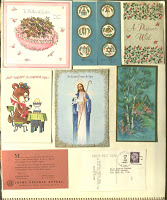
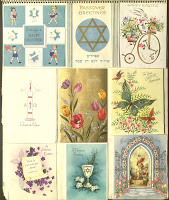 In Tucker’s 1945 autobiography, Some of These Days (named after one of her hit songs), she wrote of her early days in burlesque: “Folks wanted a belly laugh every so often. They wanted to let down their hair and unbutton their vests and be natural. They wanted to laugh at sex. Sex was funny, not necessarily intense and tragic the way the playwrights such as [Henrik] Ibsen made it out to be. Why, weren’t the best jokes in the world the ones that played on sex?”[1] Although Tucker did not stay on the burlesque circuit for long, her goal of entertaining audiences through comedic, risqué performances remained part of her act throughout her career.
In Tucker’s 1945 autobiography, Some of These Days (named after one of her hit songs), she wrote of her early days in burlesque: “Folks wanted a belly laugh every so often. They wanted to let down their hair and unbutton their vests and be natural. They wanted to laugh at sex. Sex was funny, not necessarily intense and tragic the way the playwrights such as [Henrik] Ibsen made it out to be. Why, weren’t the best jokes in the world the ones that played on sex?”[1] Although Tucker did not stay on the burlesque circuit for long, her goal of entertaining audiences through comedic, risqué performances remained part of her act throughout her career.
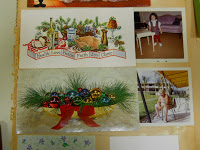 Tucker deliberately cultivated an aura of intrigue. Discrepancies in her stories appear frequently as she told and retold them. She never seems to have revealed her original name or the year of her birth to the press, for example. In the 1960s, newspaper articles lauding her for her choice to continue as an entertainer (Tucker reportedly believed that retirement was a “dirty word”) stated that she was anywhere between 70 and 80 years old.
Tucker deliberately cultivated an aura of intrigue. Discrepancies in her stories appear frequently as she told and retold them. She never seems to have revealed her original name or the year of her birth to the press, for example. In the 1960s, newspaper articles lauding her for her choice to continue as an entertainer (Tucker reportedly believed that retirement was a “dirty word”) stated that she was anywhere between 70 and 80 years old.
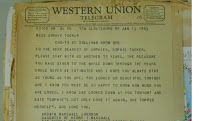 In the scrapbooks in the Brandeis collection, Tucker’s public persona emerges as she envisioned it. The thorough organization of the materials suggests that she created her public image just as carefully as she arranged her scrapbooks. Tucker kept scrapbooks beginning in 1906, and she accumulated over 400 volumes over her lifetime.
In the scrapbooks in the Brandeis collection, Tucker’s public persona emerges as she envisioned it. The thorough organization of the materials suggests that she created her public image just as carefully as she arranged her scrapbooks. Tucker kept scrapbooks beginning in 1906, and she accumulated over 400 volumes over her lifetime.
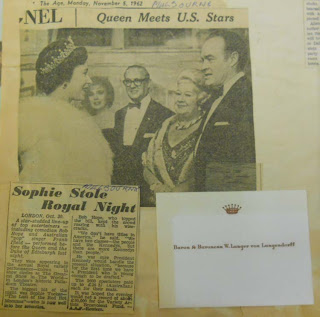 Newspaper clippings include articles mentioning Tucker and her performances, as well as interviews in theater and entertainment columns. Her name is circled and sometimes underlined as well. The articles are trimmed to fit as many on the page as possible. In the headlines from newspapers published across the United States (the titles of which are noted next to each article), Tucker’s name appears with those of popular figures such as Jackie Kennedy and Frank Sinatra. Cut-out lists of admirable women from 1960 and 1961, for example, which included former First Lady Eleanor Roosevelt and Queen Elizabeth II, mentioned votes cast for Sophie Tucker too. Photographs also capture the “Last of the Red Hot Mamas” at a variety of social events and performances.
Newspaper clippings include articles mentioning Tucker and her performances, as well as interviews in theater and entertainment columns. Her name is circled and sometimes underlined as well. The articles are trimmed to fit as many on the page as possible. In the headlines from newspapers published across the United States (the titles of which are noted next to each article), Tucker’s name appears with those of popular figures such as Jackie Kennedy and Frank Sinatra. Cut-out lists of admirable women from 1960 and 1961, for example, which included former First Lady Eleanor Roosevelt and Queen Elizabeth II, mentioned votes cast for Sophie Tucker too. Photographs also capture the “Last of the Red Hot Mamas” at a variety of social events and performances.
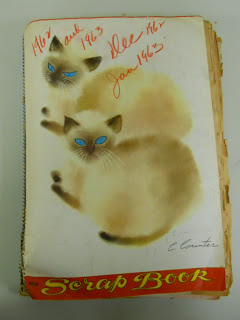
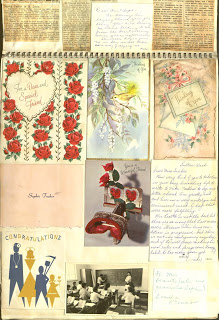 Tucker’s scrapbooks include correspondence with United States presidents, fellow entertainers, personal friends, family members and fans. She kept, for example, numerous greeting cards commemorating her birthday, holidays and other celebrations. The messages exchanged give researchers glimpses of her private life and relationship with the public. In addition to the cards, Tucker kept telegrams and letters. The telegrams were pasted to the page one atop the other to maximize space. Messages include good wishes and congratulations on performances, birthday wishes (including a poem written by her son) and invitations to events. Tucker also kept correspondence from her fans, meticulously pasted into the scrapbooks in the same manner. Fans and fellow stars requested pictures and autographs and reminisced about her many years on stage. The letters reveal how much her performances meant to audiences.
Tucker’s scrapbooks include correspondence with United States presidents, fellow entertainers, personal friends, family members and fans. She kept, for example, numerous greeting cards commemorating her birthday, holidays and other celebrations. The messages exchanged give researchers glimpses of her private life and relationship with the public. In addition to the cards, Tucker kept telegrams and letters. The telegrams were pasted to the page one atop the other to maximize space. Messages include good wishes and congratulations on performances, birthday wishes (including a poem written by her son) and invitations to events. Tucker also kept correspondence from her fans, meticulously pasted into the scrapbooks in the same manner. Fans and fellow stars requested pictures and autographs and reminisced about her many years on stage. The letters reveal how much her performances meant to audiences.
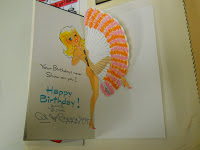 Clippings repeated favorite quotes by Tucker, such as “From birth to age 18, a girl needs good parents, from 18 to 35 she needs good looks, from 35 to 55 she needs a good personality, and from 55 on she needs cash.” Another gem went, “I’ve been rich and I’ve been poor. Believe me, honey, rich is better.” Both quotes, reprinted numerous times, flaunted her wealth and transgressed the boundaries of polite society. And her audiences loved it.
Clippings repeated favorite quotes by Tucker, such as “From birth to age 18, a girl needs good parents, from 18 to 35 she needs good looks, from 35 to 55 she needs a good personality, and from 55 on she needs cash.” Another gem went, “I’ve been rich and I’ve been poor. Believe me, honey, rich is better.” Both quotes, reprinted numerous times, flaunted her wealth and transgressed the boundaries of polite society. And her audiences loved it.
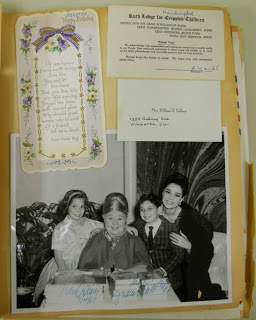 Besides entertaining her adoring fans, Tucker spent much time and money in support of charitable causes throughout her career. She supported a wide range of charities. A practicing Jew, Tucker supported Jewish-affiliated organizations and universities, including Brandeis University. She spread her wealth and also supported Christian institutions, American soldiers overseas and organizations dedicated to preventing and curing diseases. Her scrapbooks include correspondence and thanks from those who benefited from her charity. She kept notes, for example, acknowledging her donation to the Brandeis National Women’s Committee in support of the campus library and her endowment of a chair at Brandeis in 1955, the Sophie Tucker Chair in the Theatre Arts.
Besides entertaining her adoring fans, Tucker spent much time and money in support of charitable causes throughout her career. She supported a wide range of charities. A practicing Jew, Tucker supported Jewish-affiliated organizations and universities, including Brandeis University. She spread her wealth and also supported Christian institutions, American soldiers overseas and organizations dedicated to preventing and curing diseases. Her scrapbooks include correspondence and thanks from those who benefited from her charity. She kept notes, for example, acknowledging her donation to the Brandeis National Women’s Committee in support of the campus library and her endowment of a chair at Brandeis in 1955, the Sophie Tucker Chair in the Theatre Arts.
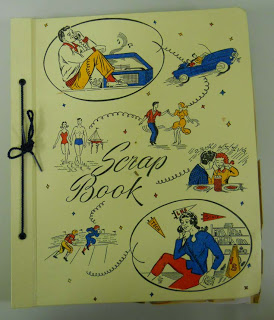 Sophie Tucker researchers Sue and Lloyd Ecker have performed extensive analysis of the scrapbooks at Brandeis, which will be presented in a documentary about Tucker to be released in the fall. In an interview, Mr. Ecker noted that because the Brandeis collection includes her later years, the scrapbooks include an especially large quantity of letters from friends and fans reminiscing. These letters not only reveal her popularity in the late 1950s and 1960s, but also illuminate the entertainment world of an earlier era and the personal, heartfelt relationships that Tucker cultivated over many decades. Mr. Ecker believes that the heart and soul of this collection are the letters from her ordinary fans who held her in high esteem. The correspondence shows how they invited her into their lives and even into their living rooms when they watched her on “The Ed Sullivan Show.”
Sophie Tucker researchers Sue and Lloyd Ecker have performed extensive analysis of the scrapbooks at Brandeis, which will be presented in a documentary about Tucker to be released in the fall. In an interview, Mr. Ecker noted that because the Brandeis collection includes her later years, the scrapbooks include an especially large quantity of letters from friends and fans reminiscing. These letters not only reveal her popularity in the late 1950s and 1960s, but also illuminate the entertainment world of an earlier era and the personal, heartfelt relationships that Tucker cultivated over many decades. Mr. Ecker believes that the heart and soul of this collection are the letters from her ordinary fans who held her in high esteem. The correspondence shows how they invited her into their lives and even into their living rooms when they watched her on “The Ed Sullivan Show.”
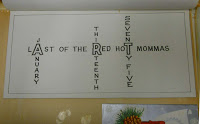 Sophie Tucker’s memory lives on in these scrapbooks, the acts of later generations of entertainers influenced by her performances, and the work of researchers working to shed light on “The Last of the Red Hot Mamas” and the world she inhabited.
Sophie Tucker’s memory lives on in these scrapbooks, the acts of later generations of entertainers influenced by her performances, and the work of researchers working to shed light on “The Last of the Red Hot Mamas” and the world she inhabited.
February 27, 2012
Notes
